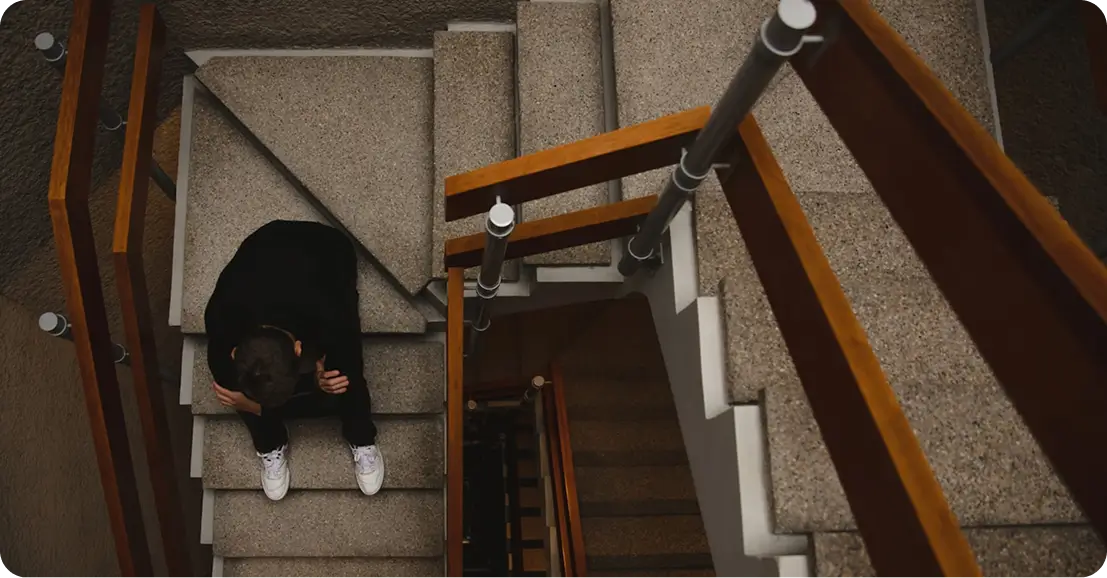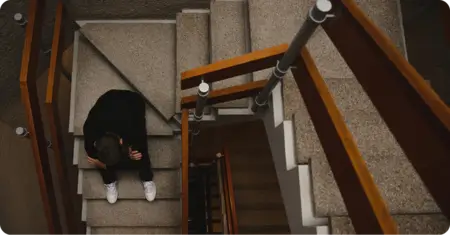Home / Inpatient Mental Health Treatment Program / Understanding Bipolar Disorder – Symptoms, Treatments, and Coping Strategies
Understanding Bipolar Disorder Symptoms, Treatments, and Coping Strategies
It’s natural for most people to undergo various changes in their mood from time to time, but someone coping with depressive episodes might be afflicted with bipolar disorder.
This condition is one where the afflicted individual has episodes of uncontrollable energy that alternate with periods of crippling depression. Bipolar disorder is categorized as a brain disorder where a person alternates back and forth between mania and depression. The symptoms of this disease vary, but treatment is possible. Medications and psychotherapy are both potential components to individuals recovering fully and gaining the ability to manage their illness with enough work and time invested successfully.
There are multiple types of bipolar disorder. Knowing which one you might have improves your chances of coping with the condition and living a successful life. Your friends and family can make a huge difference if they understand your condition and respond appropriately. If you are a friend or relative of someone diagnosed with bipolar disorder, then you may be able to help them in managing manic episodes. Lifestyle management with bipolar disorder might include developing skills to deal with stressful circumstances, being proactive about creating action plans to use when necessary, and participating in bipolar disorder support groups.
Understanding Bipolar Disorder Types
Depending on your specific bipolar disorder symptoms, you might have been diagnosed with a specific kind of bipolar disorder. How you experience various moods and symptoms of bipolar disorder and how severely they impact you play a role in determining which type of this condition you might have. Bipolar 1 could be your diagnosis if you experience a minimum of one manic episode lasting more than a week; you might also demonstrate several depressive episodes, but not everyone does. Conversely, your diagnosis might be bipolar 2 if you have a minimum of one depressive episode and hypomanic symptoms lasting a minimum of four days.
Your diagnosis might be listed as cyclothymia if you experience both depressive mood and hypomanic episodes for two consecutive years or more. This diagnosis might apply to individuals whose symptoms aren’t serious enough to qualify for bipolar 1 or 2. Cyclothymia sometimes develops into one of those two conditions, however. As such, the bipolar disorder treatment options often overlap. Receiving this diagnosis may be hard to hear because it might feel like someone is telling you that your symptoms aren’t as serious as other cases. However, this condition can dramatically and negatively influence your life, so you should find bipolar disorder resources and get treatment.
Other kinds of bipolar disorder include rapid cycling bipolar, bipolar with mixed features, bipolar with seasonal patterns, and unspecified bipolar. Rapid cycling bipolar can happen with bipolar 1 and 2, where rapid cycling involves experiencing four or more episodes of hypomanic, manic, or depressive states in one calendar year.
Bipolar with mixed features also happens with bipolar 1 and 2, but your episodes are mixed; these episodes involve experiencing depression and either mania or hypomania simultaneously or in a very rapid sequence. The different seasons or times of the year can impact your mood episodes regularly in both bipolar 1 and 2, so they would be listed as bipolar with seasonal patterns. Unspecified bipolar can be another scary diagnosis when your symptoms don’t match the current diagnostic categories. Still, it doesn’t make your condition any easier or remove your need for support and treatment.
Symptoms and Warning Signs
The primary symptom of bipolar disorder is having extreme mood swings. These alternate between extreme lows, known as depression, and extreme highs, known as mania or hypomania. Episodes of either depression or mania usually last for multiple days or even longer.
A bipolar disorder episode of depression can include many potential symptoms, such as:


- Delusional thoughts
- Despair
- Diminished appetite
- Disturbed and illogical thought processes
- Feeling empty inside
- Feeling irritable, hopeless, or sad nearly all the time
- Feelings of worthlessness
- Guilt
- Hallucinations
- Memory recall issues
- Minimal energy
- Pessimism about everything
- Self-doubt
- Suicidal thoughts
- Trouble sleeping
- Trouble with focusing on things
- Waking up early
The symptoms for manic phases in bipolar disorder are different. In a manic episode, you might take actions that have very dangerous results, such as spending a lot of money on things you can’t afford or shouldn’t buy. You might also say things or make decisions that would be typically out of character for you, and others around you might consider them hurtful or too risky. Other symptoms include the following:
The patterns of mania and depression vary from person to person. One individual might have more depressive episodes than manic states, but someone else might have the opposite. Many sufferers of bipolar disorder have normal mood periods between their episodes, and these might be times that they are shocked at what they did or didn’t do during a recent episode. In many manic phases, individuals are unaware of what they’re going through. Depression and mania are both episodes that can result in strange sensations, delusions, and hallucinations. The condition’s extreme nature makes it hard to maintain steady employment, strains interpersonal relationships, and increases the risk of self-harm.
- Agitation
- Avoiding sleep
- Feeling inspired by grandiose plans or new ideas
- Feelings of self-importance
- Getting distracted easily
- Happiness to the point of overjoy or elation
- Having lots of energy
- Irritability
- Talking fast
Diagnosis and Seeking Help
While you might be able to identify certain symptoms of bipolar disorder, official diagnosis requires a healthcare professional. This might be a psychiatrist, but it could also be a doctor specializing in mental health issues. If you feel your illness is leading you towards self-harm, then get help immediately. Your assessment will likely involve several questions, and your responses can help your healthcare professional diagnose your condition.
Further investigation might help narrow down your specific type and point toward the appropriate treatments. The questions should cover recognizing symptoms and when you initially experienced them. You’ll also be asked about how you were feeling before and during episodes of depression or mania. Your healthcare professional will inquire about your family history and medical background. You might also be examined for physical issues contributing to or exacerbating the condition, such as an overactive or underactive thyroid.
Treatment Approaches
The treatment options available for bipolar disorder typically focus on three specific goals. First, healthcare professionals attempt to reduce the severity of the manic and depressive episodes that their clients have. Second, they seek to minimize how many actual episodes happen. Third, they want to empower their clients to live normally.
Without proper treatment, bipolar disorder episodes of mania can run from three months to half a year, and depressive episodes might run from six months to a full year. Treatment possibilities might include medicines, education, psychological treatment, and lifestyle advice. Clients who learn to recognize their triggers can be vigilant about managing the early signs of episodes. Psychological treatment can help clients manage their depression and relationships. Lifestyle advice might incorporate dietary adjustments, regular exercise, improved sleep, and planning activities that build confidence and self-worth.
Medicines called mood stabilizers are taken daily over a long-term period to prevent episodes and symptoms of both mania and depression. Mood stabilizers usually fall into the three categories of lithium, antipsychotic medicines, and anticonvulsant medicines. Lithium is often the primary medication for treating bipolar disorder, and it’s a long-term form of treatment for both kinds of episodes. The prescriptions often last six months at a minimum, and you shouldn’t stop this medication without your doctor’s instructions. Regular blood tests measure your lithium levels but also check your thyroid and kidney functions. While on lithium, you need to avoid NSAIDs. This includes ibuprofen.
The available anticonvulsant medications include lamotrigine, carbamazepine, and valproate. They’re all three long-term mood stabilizers that might treat manic episodes. Healthcare professionals might use one of these by itself, or they might also prescribe one alongside lithium. The four primary antipsychotic medications are risperidone, quetiapine, olanzapine, and haloperidol. These are also long-term mood stabilizers, but they can result in side effects. The initial doses are often low to avoid weight gain, dry mouth, constipation, and blurred vision.
Coping Strategies
Bipolar disorder is a condition that can make you feel as if you have little to no control over yourself. However, there are many things you can do to manage your condition. Healthcare professionals can teach you many coping strategies, but it’s up to you to execute them. It starts with monitoring your mood over time. Use a mood diary or your phone to track your patterns, and then use this information to identify your triggers. These are different for each person, including lack of sleep, times of uncertainty or change, significant life events, or just feeling busy and overwhelmed. Also, watch out for warning signs, as certain patterns of feelings might indicate an episode is coming up. These might include changes in your sleeping, appetite, or behavior. When you know an episode might be looming, you have time to ensure support systems are available. You’ll have time to focus on caring for yourself, and you might be able to share your warning signs with those around you who might help.
It’s important to stick to a routine. This can calm you down if your mood is too high, but it can also motivate you during a low mood. In either case, you improve your emotional stability. Emphasize daily activities, and be consistent about when you eat or go to bed. Incorporate time for hobbies, social activities, relaxation, and opportunities to practice mindfulness. Keep taking your medications at the same time every day. Doing this has the advantage of managing side effects and keeping consistent levels of medication in your body. Avoid the stresses you can while managing the rest as best you can. Plan for potential crises in advance by getting enough sleep and caring for your physical health. Think more clearly and stabilize your mood by eating a balanced, nutritious diet. Regular exercise can keep you relaxed and manage stress. You’ll burn energy when you feel too high and release endorphins that make you feel good during a low swing.
A support network is very important in managing your mood. Healthcare professionals and a medical team can help you learn about your condition, monitor it, and implement medications and treatment. Friends and family can be people you trust who can recognize your symptoms, listen to you, help you stick to your routine, and guide you in crisis planning or remembering past episodes. Peer support is a great idea to look into as you connect with others who have either battled this condition or are currently dealing with it. Exchanging experiences and ideas helps everyone grow. These might range from local meeting groups to online communities that you participate in.
Support Networks and Resources
At Granite Recovery Centers, we can help you or someone you care about in coping with bipolar disorder. We utilize evidence-based care models to offer our clients highly effective treatments with the best odds of long-term success. Illness management and recovery, or IMR, is a rehabilitation program based on a specific curriculum that helps some clients with mental illness. We might also apply dialectical and cognitive behavioral therapies for individuals looking to improve their emotional regulation, thought patterns, and interpersonal abilities. Our inpatient mental health treatment options can help you psychologically, emotionally, and behaviorally, whether you’re dealing with bipolar disorder or other mental health issues. We can also help you with residential and dual-diagnosis situations.
Contact Us to Get the Help You Need
If you want to visit one of our New England drug rehab centers, please contact us at Granite Recovery Centers. Our experts will work with you to find a high-quality treatment option that meets your needs. We strive to provide a holistic level of treatment with evidence-based care, giving you the help necessary to regain your sobriety for good.
Take the Next Step and Reach Out to Our Addiction Professionals

